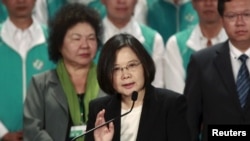The ocean strait that divides China from Taiwan was once a potential military flashpoint. Taiwan rules itself, but China says the two must eventually unify. Now Taiwan’s anti-China party leads in opinion polls ahead of a presidential election Saturday. But signs show that the worst in relations may be over.
Former Taiwan president Lee Teng-hui suggested state-to-state relations with China in the 1990s, and his successor Chen Shui-bian advocated formal independence from Beijing. China threatened to use force against Taiwan as recently as 2005. But a woman who worked for both presidents has said she will avoid provoking China if elected president herself on Saturday. She said she wants to talk and avoid mishaps. She’s Tsai Ing-wen and she leads in opinion polls ahead of the vote.
Lin Chong-pin, a retired strategic studies professor who knows the candidate, said Tsai learned lessons from Chen Shui-bian's presidency and knows Taiwan's staunchest informal ally Washington wants stable China-Taiwan relations.
"Tsai after all has been learning. She has a long gestation period, from 2000 to 2015. She has lost two elections, which was actually very valuable experience to her to make her think and to revise," said Lin.
Tsai's tempered position sends a signal to China, the United States and Taiwan's electorate not to panic about rising tension. Her Democratic Progressive Party or DPP leadership could even extend today's fragile but stable ties with China. The two sides have been separately ruled since Chiang Kai-shek's Nationalists lost the Chinese civil war in the 1940s and rebased in Taipei. However, Taiwan's constitution still binds the two sides under one flag.
Taiwan's President Ma Ying-jeou must step down in May due to term limits, after signing more than 20 deals with Beijing on trade, transit and investment. His government and Chinese officials agreed to negotiate on the premise that both sides still belong to a single China but subject to different interpretations.
China has warned Taiwan's future leaders to negotiate on that same premise but Tsai prefers more autonomy for Taiwan and rejects that idea. How far she could go in holding today's fragile friendship with China depends partly on reaction from Beijing.
Ross Feingold, Taipei-based senior adviser with American political risk manager DC International Advisory, says China might still look for a way to keep working with Taiwan on trade agreements. Taiwan's legislature has not yet ratified a 2013 service trade liberalization deal with China, and a tariff-cutting deal is still being negotiated.
"Hopefully China reacts in a positive way, but we just don't know. The best case scenario is that China is comfortable working with the new DPP government and moving forward on some of these trade agreements. These are the areas where China can accommodate or where they can be difficult," said Feingold.
Taiwan's trade with China reached a record $130 billion in 2014 and has brought in millions of tourists for the island's thirsty service industry. A government poll found last year that 70 percent of Taiwanese favor today's relations with China, not formally declaring independence at the risk of war but not unifying under the Communist government.
But many Taiwanese complain they see no trickledown of benefits from stronger economic ties. Some say the Ma government is too opaque about its ties with China and worry Beijing will leverage economic relations to control Taiwan politically. Some in Tsai's party still advocate Taiwan's formal independence, a worry for Beijing as well as local voters who prefer to avoid conflict.
Chen Chih-kung, a 58-year-old public servant from Taiwan who attended a rally Saturday for the Nationalist Party's presidential candidate in the Saturday election, fears that Tsai will face pressure from within her party to be harsher toward China than what she publicly advocates.
He said he thinks Tsai's reign shouldn't be like former president Chen Shui-bian's, but fears that her attitude toward mainland China might not follow her stated intentions. She might not take that route, he added, but voters cannot know in advance.
Tsai is running against Nationalist Party chairperson Eric Chu, who advocates extending dialogue with China under today's conditions. The Nationalists said last week they were running eight percentage points behind Tsai's campaign.





